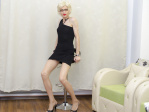I came across an ad on FB for a Writers Workshop in Minneapolis, USA and on a whim decided to enroll. It's a one-day workshop. My expectations are low but I'm excited about learning whatever I don't know.
Has anyone participated in a writer's workshop either as a speaker or attendee? What was your experience?
Join the best erotica focused adult social network now
Login
Lush Cams
Online Now!
Writer Workshops
I've attended a multi-week adult ed evening course on writing, years ago (like, fifteen). It was pretty good. I'm always dubious about such things, especially when the person running the course admits they're not a published author, but are trying!
But it was valuable in terms of getting us to think about different author perspectives to tell a story effectively (first, third, and that pesky 'god' mode: omniscient) and there was a module on screenwriting which was fascinating. Seems like it'd be easy, but it's like writing Flash here, without the luxury of direction.
The thing I never appreciated before taking the course was that most of the scripts floating around online have been written after the movie's released by geeks with too much time on their hands, or are production scripts with camera pans and fades and all that jazz added. A true script - those pitched to actors and movie exec - is usually told without any of that; just dialogue and super-terse, clever use of scene-setting to imply what is later converted into actual pan/zoom/cut directions in subsequent drafts. Was worth the entry fee just for being exposed to that, and one of the tasks being to write a given scene through dialogue and tight descriptions alone.
I think you'll probably get something out of a workshop.
EDIT: Two other things came out of the course and ended up on my bookshelf: A copy of Fowler's A Dictionary of Modern English Usage that I think I've opened twice. And Robert McKee's Story, which I cannot praise highly enough.
But it was valuable in terms of getting us to think about different author perspectives to tell a story effectively (first, third, and that pesky 'god' mode: omniscient) and there was a module on screenwriting which was fascinating. Seems like it'd be easy, but it's like writing Flash here, without the luxury of direction.
The thing I never appreciated before taking the course was that most of the scripts floating around online have been written after the movie's released by geeks with too much time on their hands, or are production scripts with camera pans and fades and all that jazz added. A true script - those pitched to actors and movie exec - is usually told without any of that; just dialogue and super-terse, clever use of scene-setting to imply what is later converted into actual pan/zoom/cut directions in subsequent drafts. Was worth the entry fee just for being exposed to that, and one of the tasks being to write a given scene through dialogue and tight descriptions alone.
I think you'll probably get something out of a workshop.
EDIT: Two other things came out of the course and ended up on my bookshelf: A copy of Fowler's A Dictionary of Modern English Usage that I think I've opened twice. And Robert McKee's Story, which I cannot praise highly enough.
Please browse my digital bookshelf. In this collection, you can find 121 full stories, 10 micro-stories, and 3 poems with the following features:
* 30 Editor's Picks, 78 Recommended Reads.
* 16 competition podium places, 11 other times in the top ten.
* 23 collaborations.
* A whole heap of often filthy, tense, hot sex.
Quote by Trystin715
I came across an ad on FB for a Writers Workshop in Minneapolis, USA and on a whim decided to enroll. It's a one-day workshop. My expectations are low but I'm excited about learning whatever I don't know.
Has anyone participated in a writer's workshop either as a speaker or attendee? What was your experience?
Talk to Verbal.
I think he regularly attends a writers group that ends each session with an orgy. I could be wrong about that last thing.
Our library system has a writer-in-residence. I’m tempted to ‘discuss’ my stuff and ‘their’ stuff with them, but I fear the loss of my anonymity more than incarceration.
Tell us about your workshop experience.
Quote by Ping
Talk to Verbal.
I think he regularly attends a writers group that ends each session with an orgy. I could be wrong about that last thing.
Our library system has a writer-in-residence. I’m tempted to ‘discuss’ my stuff and ‘their’ stuff with them, but I fear the loss of my anonymity more than incarceration.
Tell us about your workshop experience.
You are, sadly, wrong about the orgy. It's mostly women, so any orgy would be largely lesbian. Which is fine by me.
I haven't gone to many workshops, though I am about to sign up for a three day workshop here in town. As much for networking as for the info. I'm excited about it.
I think they can do a LOT of good, if the fit is right, and if you are open-minded. I went to an afternoon workshop on romance and erotica that was worthless, I did another half day workshop on plot and "thinking in scenes" that rocked.
My writing group really doesn't talk about the mechanics of writing that much, it's more focused on marketing and self-publishing and gets into granular detail about Amazon and buying ads and website traffic, yadayadayada. They talk about the kinds of things I need to learn, and I really like the people (they are mostly sci-fi/horror/fantasy, I came into the group as an erotica writer, and they just saw it as another genre, and I felt very welcome there).
I'd be interested in what other people say about their workshop experiences.
Yes, I will update here after I attend March 7th. They offer access time to shop your work as well as critiques of your work. These are extra costs , of course.
Here's the link for the one I am attending. I wonder if any other Lushies are going. Might be nice to meet the sex gods, goddesses, and mortals that make up this group.
https://minnesotawritingworkshop.com/
Here's the link for the one I am attending. I wonder if any other Lushies are going. Might be nice to meet the sex gods, goddesses, and mortals that make up this group.
https://minnesotawritingworkshop.com/
A man in the house is worth two in the street- Mae West
Quote by Katherine
I've attended many workshops, all run by the same (published) woman. It's changed the way I read and write, but mostly how I edit. We met once a week for about 6 weeks, and it was fantastic. I miss the atmosphere and almost everything about it.
Did your workshop end with an orgy like Verbs? He's being modest. I've seen pictures.
Details about the workshop:
It was about 75% women and 25% men.
There were five time-block periods during the day. Each time-block period had three classes running concurrently each in a different room that one can choose from. For example, the first time block 9:30 to 10:30 had:
Crafting Dynamic Characters for Young Adult and Middle-Grade Readers
How to Write a Damn Good Query Letter
Social Media for Authors
I chose the third and learned how to create a social media presence with FB, Twitter, and . I also learned which demographics use which social media and why you should choose one of them as a primary means of communication to develop your fanbase. I learned why you should build a fan base before you try to get published.
In other time-blocks during the day, I attended:
a) Ten Keys to Writing Success
b) Writers Got Talent- A Page 1 Critique Fest
c)Three Laws and Ten Pages: How to use Newtonian Physics to add Momentum to Your Fiction.
I did not stay for the fifth time-block. The Topics were: The Timeline of a Book, Conquering the Dreaded Synopsis, and How to Create Awesome Worldbuilding for Your Science Fiction and Fantasy Genres.
The Writers Got Talent Page 1 Critique Fest was the largest session attended with 150 or more attendees. In this session, six literary agents sat in the front of the room with a pile of double-spaced Page 1s from aspiring authors. Submitted at registration time, the Page 1s were randomized and each lit agent had the same set of about 20 page 1s to follow along as a moderator read them to the audience. The instructions were for lit agents to raise their hand as soon as they knew they would not read the author's material any further. Then the lit agents would explain why they rejected the submission based upon what they read.
It was brutal at times.
About 50% of the Page 1 submissions were rejected within the first or second sentence. Another 30%-40 were rejected before reading halfway down the page. Only one submission was not rejected by the end of the first page. And all the lit agents said why they liked it and why they would read more pages if they were reviewing this for real. One agent said the author of the submission should collect her business card after the session.
Reasons for rejection:
a) the story began with someone waking up and several lines were wasted on who it was or why waking up was important to the story. Get to the story.
b) Not introducing the protagonist. Using "I" or "me" and not explaining who "I" or "me" was.
c) Scenery descriptions by themselves were boring. One author had three sentences that were roughly the same length to describe a lake, the sky, and the tree colors but the story was about Malcolm on a morning run. It took too long to get the reader's attention and the writing was a harbinger of what the rest of the story was going to be like.
d)Awkward descriptions of common actions. One author established the anxiety of his character in one sentence and then began with descriptions of mouth breathing and bringing air into and/or out of his mouth and nose. The lit agent said we already know how anxious people look and feel and multiple descriptions of their physiology under anxiety were unnecessary.
e) Trite or trope phrases were unacceptable. One author began with (paraphrasing) "He felt like he was caught between a rock and a hard place." Immediate rejection by all lit agents.
One of the best pieces of advice was (paraphrasing) "Your first three sentences have to be written so they only apply to your book. No one else's book They are to be written in a way that they could never be used to introduce any else's story. Only yours."
The themes throughout each session were: Introduce your protagonist(s) on the first page, get to your story, don't tell the backstory first, and no prologues. If you absolutely need a prologue then make it Chapter One.
The other point was that famous authors break these rules all the time because they are famous. When you are famous, you can break them, too. First, be famous, then break rules. Lit agents will reject your submission if you break rules and aren't famous.
I enjoyed the day and it was a good experience. I would do it again.
It was about 75% women and 25% men.
There were five time-block periods during the day. Each time-block period had three classes running concurrently each in a different room that one can choose from. For example, the first time block 9:30 to 10:30 had:
Crafting Dynamic Characters for Young Adult and Middle-Grade Readers
How to Write a Damn Good Query Letter
Social Media for Authors
I chose the third and learned how to create a social media presence with FB, Twitter, and . I also learned which demographics use which social media and why you should choose one of them as a primary means of communication to develop your fanbase. I learned why you should build a fan base before you try to get published.
In other time-blocks during the day, I attended:
a) Ten Keys to Writing Success
b) Writers Got Talent- A Page 1 Critique Fest
c)Three Laws and Ten Pages: How to use Newtonian Physics to add Momentum to Your Fiction.
I did not stay for the fifth time-block. The Topics were: The Timeline of a Book, Conquering the Dreaded Synopsis, and How to Create Awesome Worldbuilding for Your Science Fiction and Fantasy Genres.
The Writers Got Talent Page 1 Critique Fest was the largest session attended with 150 or more attendees. In this session, six literary agents sat in the front of the room with a pile of double-spaced Page 1s from aspiring authors. Submitted at registration time, the Page 1s were randomized and each lit agent had the same set of about 20 page 1s to follow along as a moderator read them to the audience. The instructions were for lit agents to raise their hand as soon as they knew they would not read the author's material any further. Then the lit agents would explain why they rejected the submission based upon what they read.
It was brutal at times.
About 50% of the Page 1 submissions were rejected within the first or second sentence. Another 30%-40 were rejected before reading halfway down the page. Only one submission was not rejected by the end of the first page. And all the lit agents said why they liked it and why they would read more pages if they were reviewing this for real. One agent said the author of the submission should collect her business card after the session.
Reasons for rejection:
a) the story began with someone waking up and several lines were wasted on who it was or why waking up was important to the story. Get to the story.
b) Not introducing the protagonist. Using "I" or "me" and not explaining who "I" or "me" was.
c) Scenery descriptions by themselves were boring. One author had three sentences that were roughly the same length to describe a lake, the sky, and the tree colors but the story was about Malcolm on a morning run. It took too long to get the reader's attention and the writing was a harbinger of what the rest of the story was going to be like.
d)Awkward descriptions of common actions. One author established the anxiety of his character in one sentence and then began with descriptions of mouth breathing and bringing air into and/or out of his mouth and nose. The lit agent said we already know how anxious people look and feel and multiple descriptions of their physiology under anxiety were unnecessary.
e) Trite or trope phrases were unacceptable. One author began with (paraphrasing) "He felt like he was caught between a rock and a hard place." Immediate rejection by all lit agents.
One of the best pieces of advice was (paraphrasing) "Your first three sentences have to be written so they only apply to your book. No one else's book They are to be written in a way that they could never be used to introduce any else's story. Only yours."
The themes throughout each session were: Introduce your protagonist(s) on the first page, get to your story, don't tell the backstory first, and no prologues. If you absolutely need a prologue then make it Chapter One.
The other point was that famous authors break these rules all the time because they are famous. When you are famous, you can break them, too. First, be famous, then break rules. Lit agents will reject your submission if you break rules and aren't famous.
I enjoyed the day and it was a good experience. I would do it again.
A man in the house is worth two in the street- Mae West
I'm glad you went! Some workshops are more like a celebration of writing and too nice to be constructive. Sounds like you got a good one.
Take what you heard, learn it, breathe it, and forget it when you write. Use it when you edit. Otherwise you'll never be able to do it again. That was my experience anyway. I constantly read published work as well, to get me out of my head and keep my writing more fresh.
Take what you heard, learn it, breathe it, and forget it when you write. Use it when you edit. Otherwise you'll never be able to do it again. That was my experience anyway. I constantly read published work as well, to get me out of my head and keep my writing more fresh.
Quote by Trystin715
Details about the workshop:
It was about 75% women and 25% men.
There were five time-block periods during the day. Each time-block period had three classes running concurrently each in a different room that one can choose from. For example, the first time block 9:30 to 10:30 had:
Crafting Dynamic Characters for Young Adult and Middle-Grade Readers
How to Write a Damn Good Query Letter
Social Media for Authors
I chose the third and learned how to create a social media presence with FB, Twitter, and . I also learned which demographics use which social media and why you should choose one of them as a primary means of communication to develop your fanbase. I learned why you should build a fan base before you try to get published.
In other time-blocks during the day, I attended:
a) Ten Keys to Writing Success
b) Writers Got Talent- A Page 1 Critique Fest
c)Three Laws and Ten Pages: How to use Newtonian Physics to add Momentum to Your Fiction.
I did not stay for the fifth time-block. The Topics were: The Timeline of a Book, Conquering the Dreaded Synopsis, and How to Create Awesome Worldbuilding for Your Science Fiction and Fantasy Genres.
The Writers Got Talent Page 1 Critique Fest was the largest session attended with 150 or more attendees. In this session, six literary agents sat in the front of the room with a pile of double-spaced Page 1s from aspiring authors. Submitted at registration time, the Page 1s were randomized and each lit agent had the same set of about 20 page 1s to follow along as a moderator read them to the audience. The instructions were for lit agents to raise their hand as soon as they knew they would not read the author's material any further. Then the lit agents would explain why they rejected the submission based upon what they read.
It was brutal at times.
About 50% of the Page 1 submissions were rejected within the first or second sentence. Another 30%-40 were rejected before reading halfway down the page. Only one submission was not rejected by the end of the first page. And all the lit agents said why they liked it and why they would read more pages if they were reviewing this for real. One agent said the author of the submission should collect her business card after the session.
Reasons for rejection:
a) the story began with someone waking up and several lines were wasted on who it was or why waking up was important to the story. Get to the story.
b) Not introducing the protagonist. Using "I" or "me" and not explaining who "I" or "me" was.
c) Scenery descriptions by themselves were boring. One author had three sentences that were roughly the same length to describe a lake, the sky, and the tree colors but the story was about Malcolm on a morning run. It took too long to get the reader's attention and the writing was a harbinger of what the rest of the story was going to be like.
d)Awkward descriptions of common actions. One author established the anxiety of his character in one sentence and then began with descriptions of mouth breathing and bringing air into and/or out of his mouth and nose. The lit agent said we already know how anxious people look and feel and multiple descriptions of their physiology under anxiety were unnecessary.
e) Trite or trope phrases were unacceptable. One author began with (paraphrasing) "He felt like he was caught between a rock and a hard place." Immediate rejection by all lit agents.
One of the best pieces of advice was (paraphrasing) "Your first three sentences have to be written so they only apply to your book. No one else's book They are to be written in a way that they could never be used to introduce any else's story. Only yours."
The themes throughout each session were: Introduce your protagonist(s) on the first page, get to your story, don't tell the backstory first, and no prologues. If you absolutely need a prologue then make it Chapter One.
The other point was that famous authors break these rules all the time because they are famous. When you are famous, you can break them, too. First, be famous, then break rules. Lit agents will reject your submission if you break rules and aren't famous.
I enjoyed the day and it was a good experience. I would do it again.
Thanks for sharing this. I am glad you got so much out of it. That synopsis panel would have been a must attend for me. I suck at them
I just plopped down some money on a workshop here in April. Signed up for the "read the first page" thing. Yors sounded really helpful.
Take what you heard, learn it, breathe it, and forget it when you write. Use it when you edit. Otherwise you'll never be able to do it again. That was my experience anyway. I constantly read published work as well, to get me out of my head and keep my writing more fresh.
The lit agents agreed with you. I am a novice at writing. It was good for me to understand what professional expectations exist. Now I need to practice my editing and re-writing.
The lit agents agreed with you. I am a novice at writing. It was good for me to understand what professional expectations exist. Now I need to practice my editing and re-writing.
A man in the house is worth two in the street- Mae West
Lush Cams
Online Now!






















